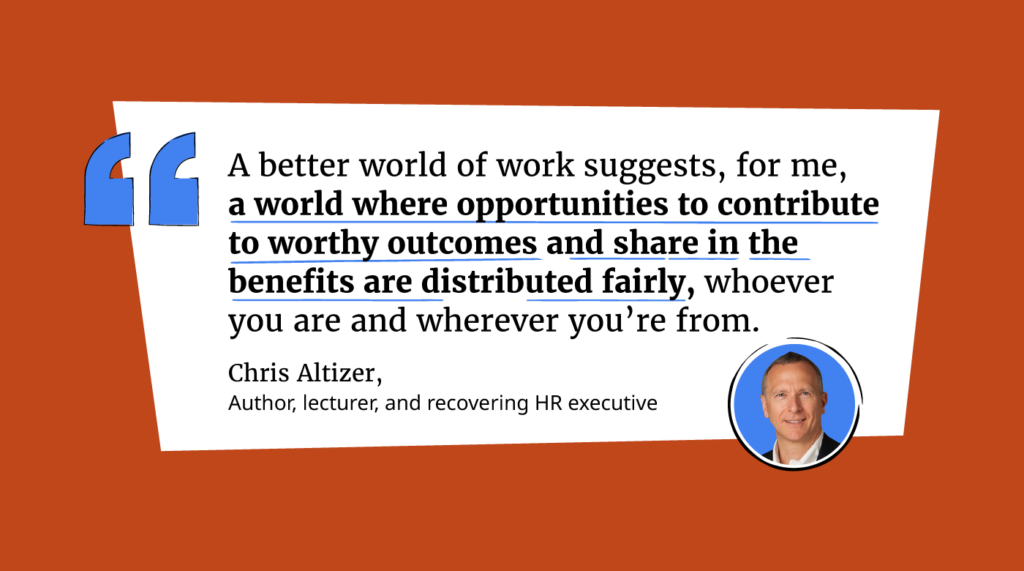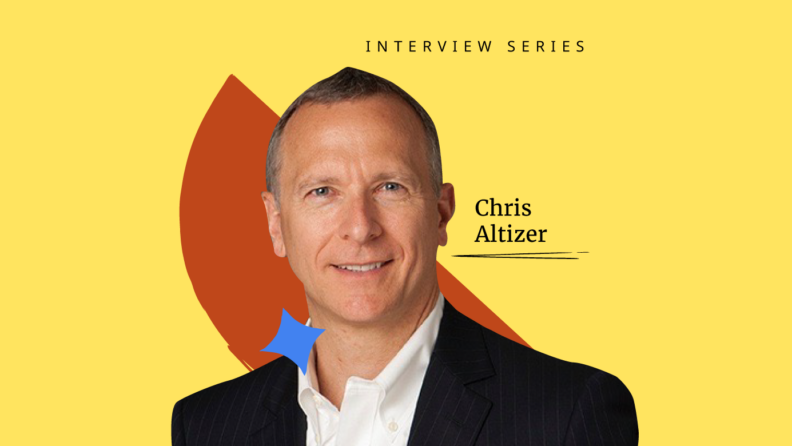We’re passionate about the world of work, and how we can make it better. To help satisfy our curiosity, we’ve launched an interview series where we pick the brains of experienced leaders, business owners, managers, and individual contributors to get their thoughts on how we can collectively build better workplaces.
We’d love to get to know you a bit better, tell us a bit about your backstory.
I describe myself as a retired and recovering HR executive now writing, consulting, and teaching HR management at Florida International University College of Business and also Inclusion at FIU’s Center for Leadership. I’ve been fortunate to hold a series of global jobs including SVP HR and head of Talent at Pfizer and am now working to develop a new generation of HR leaders in a world that really needs them!
I got into HR in the 1980’s doing training and for more than twenty years I’ve practiced and taught martial arts, so I guess teaching has always been a thing for me. Now, when I’m not teaching at FIU, I teach aerial yoga and Mindfulness-Based Stress Reduction. Upon reflection, I see I’m really a serial student!
If we were to ask a friend to describe your personality to us, what would they say?
Probably that I’m confident (bordering cocky), calm, ambitious, open, flexible, willing to take risks and a little mischievous – that’s what my Hogan personality profile says, anyway. I’ve learned a lot about personality over my career and had research on mindfulness and personality published in Consulting Psychology Journal in 2020. If anyone would have said a few years back that I’d be a published researcher, I (and all my friends) would have laughed!
Thinking back to your career journey, what’s an interesting story that stands out?
I think an interesting thing about my career is how much my studies and practices outside of work have influenced me while at work. It’s an ongoing journey – even now—but lessons from martial arts, yoga, mindfulness, even scuba diving, have influenced what I think and how I respond to what’s going on. Like anyone else, I’ve got decades of would’ve, could’ve, should’ve moments in my career. That said, my training, especially in mindfulness, increasingly helps me put these in perspective and learn as I go. No mistake—I still have these moments! But I find I can spend less time regretting the past or fearing the future and more in the present moment—which is the only moment we really have.
What’s the most impactful lesson you've learned over your career thus far?
The most impactful lesson thus far I’ve learned extends from that last point. I’ve had a successful corporate HR career that has provided a life full of opportunities for advantage. In the last few years, however, I’ve come to realize those opportunities for the advantages I’ve been granted have been both earned and unearned. My earned advantages came from my own hard work and applied talents and support from mentors and advocates. While it’s taken (and is still taking) years, my understanding of my unearned advantages has come into sharper focus.
You see, I’m a white, straight, Christian-raised, able-bodied, English-speaking, extroverted male raised in a safe, educated, healthy environment. If I was three inches taller, I’d have it all! These are my unearned advantages. I can’t give them back or away. Yes, it’s true that every person like me hasn’t achieved financial and professional success. The point is, I’ve gotten more shots at it than people unlike me. I’ve come to realize that recognizing and working with unearned advantages is, ironically, its own challenge. But I think it’s a key input to the next question.
Thanks for giving us some insight into who you are! Let’s jump into things. When you hear the phrase “build a better world of work”, what comes to mind?

I’d like to focus here on a subject so hot it’s now being legislated in some states, including my own (Florida). Somehow, programs designed to foster diversity, equity, & inclusion (DEI) are interpreted or received as fostering division, inequity, & exclusion. There’s plenty of evidence that diverse and inclusive organizations outperform others but the programs of the last few decades have not moved the needles—at all. In fact, the backlash and polarization we’re seeing tells us the approaches are not only not working but contributing to the reaction. Why is that?
For you, what’s the main blocker you see as standing in the way of building a better world of work?
The main blocker to building a better world of work is the inequity of opportunity for people to contribute or earn advantage, and the inability and unwillingness of many to understand that reality.
We like to think that anyone can succeed no matter the obstacles they face—and have examples to prove it. Unfortunately, that fails to recognize that opportunities do, in fact, have much to do with who you are and where you’re from. Our workplaces have become as polarized as our politics.
My co-author Gloria Johnson-Cusack and I (Growing the Elephant – increasing earned advantage for all) have researched the question. One of the main blockers to equitable opportunity is the reality of unearned advantage. Unfortunately, the way it’s presented in DEI programming—as “privilege”—has failed completely. Without a doubt, historical legacies and systemic barriers to equity exist and must be called out. The opportunity for workplace DEI programs, however, is in calling in individual participants wherever they are in their lived experiences to recognize and work with unearned advantages to grow opportunities for earned advantage.
Typical workplace programs, including diversity programs, don’t focus on awareness. We've learned since childhood to ‘pay’ and ‘give’ attention to this and that, but are expected to simply ‘be’ aware. The reason mindfulness programs have taken off (and taken flak when done poorly) is that they focus on ‘awareness.’ Self awareness allows me to be plugged into myself—what I'm feeling and thinking so I don’t ‘lose it’ when stressed—at least not unintentionally. Other awareness allows me to be plugged into others—enabling empathy or even compassion with them in tough situations. Self-on-other awareness allows me to realize the impact I’m having on another so I can adjust what I’m doing in response to their reaction to realize my intention with that person. It’s a virtuous cycle. Unfortunately, typical DEI programs don’t focus on building the capacities for self, other, and self-on-other awareness, or how to extend compassion, or the simple practices individuals can apply to grow opportunities for earned advantage—for themselves as well as others.
The irony is that people with unearned advantages need to be involved in this work the most! Like unconscious biases, holding unearned advantage is unconscious and really uncomfortable to accept once it becomes conscious. People with few unearned advantages are all too aware of that fact—their challenge is to deal with that reality without becoming chronically discouraged, enraged, or withdrawn.
What’s one thing within our control that we can practically do to build a better world of work today? And, how do you recommend going about it?
This subject isn’t easy.
Often, people with many unearned advantages resist or withdraw from it while those with few are outraged or exhausted by it. One thing within our control is to focus on what is in our control—ourselves.
The intensity around DEI has gotten such that people are not only not open to others’ lived experiences but don’t reflect on their own lived experiences. Gloria and I encourage people to adopt a healthy form of practice of reflection and self-inquiry to recognize and work with unearned advantage to grow opportunities for earned advantage. Whoever you are and wherever you’re from, whether you have few or many unearned advantages, and whatever you believe is possible to build a better world of work.
Periodically asking and authentically answering for yourself what you believe about equity and why you believe it is a good start.
Each of us, regardless of role or level at work, have the potential to grow opportunities for earned advantage. One thing in our control is to take a breath (literally) when stressed and try to understand what’s really happening in the present moment. This requires questioning assumptions and the biases that every one of us has.
One favorite practice of ours is to check yourself when you give “the benefit of the doubt.” Whether to a coworker, boss, subordinate, or a customer, ask yourself when you extend a second or risky chance to someone else, what influenced your decision? Taking the moment to reflect on this kind of decision, or a decision as simple as deciding who you’ll sit with at lunch, can increase opportunities for earned advantage—even if just one at a time.
Can you share one thing you’ve experienced, seen, or read about that is leading us towards a better world of work?
Being the serial student, I’m a big fan of Carol Dweck’s work on Growth Mindset. Basically, the idea is that a willingness to attempt, fail, and learn contributes to success. A ‘fixed’ mindset believes it is what it is, there’s only so much, and so on. A Growth Advantage Mindset, our adaptation, is one that is willing to accept that how it thinks the world should be is not always how it is, that not everyone has the same lived experiences in similar situations, and that opportunities for earned advantage can be abundant through intentional action and increased awareness.
I’m curious, thinking about building a better world of work, is there a company and/or leader who stands out to you as someone we should follow? If so, what are they up to?
My personal north stars have been my friends and mentors Rhonda V. Magee and Dave Ulrich. Dave is probably known to many of your readers as the pre-eminent guru and expert on leadership and organizations. He’s written something like 30 books on the subjects. Rhonda inspired me on my own path years ago with her work on ColorInsight and has since contributed to the field so greatly through her work as a mindfulness teacher, law professor, and author of The Inner Work of Racial Justice (Tarper Perigree 2019). That’s a must read.
How can our readers follow your work?
You can follow me on LinkedIn or get updates on Growing the Elephant.
Thank you for adding your voice to People Managing People’s interview series on How to Build a Better World of Work!
Add Your Voice To The Conversation
Join our interview series and share your ideas for how we can build a better world of work!


